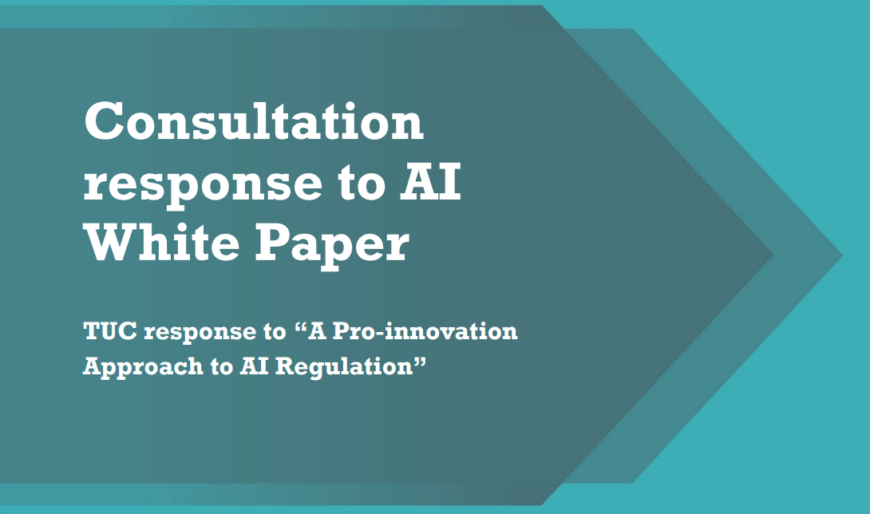Consultation response to AI White Paper
TUC response to “A Pro-innovation Approach to AI Regulation”

Summary
Trade unions play a key role in ensuring that the rights and interests of working people are represented and recognised. For example, we advocate the importance of strong collective bargaining rights, appropriate regulation and enforcement to ensure the protection of employment rights, as well as equality of treatment for all, regardless of factors such as race, religion, age, gender, disability, sexuality and access to financial resources.
In light of the purpose and goals of the TUC, we have responded to this consultation from the perspective of workers and the workplace. We emphasise the importance of context specific governance of AI and highlight that the A pro-innovation approach to AI regulation white paper does not provide specifically for the workplace. We believe this to be a serious omission in the government’s approach.
Although we support the importance of the principles outlined in the AI white paper, we believe the government’s proposals are inadequate and do not meet the urgent and pressing need for regulation of the use of AI at work and beyond. This change must be in the form of a legislative upgrade of workers’ rights to address the implications of the use of AI in the workplace.
The principles articulated in the AI white paper are important, but incomplete. We have set out a series of values in our AI Manifesto Dignity at Work and the AI Revolution and we advocate the use of a set of principles based on these values.
In any event, we predict that the white paper principles will be ineffective in the absence of any statutory footing and when left to be enforced by significantly under- resourced regulators.
Voluntary frameworks are likely to be abandoned by technology companies once in conflict with the development of commercially attractive products.
The context-specific approach recommended by the government is sensible. However, in our view urgent context specific legislative change is needed. In particular, we call for regulation of AI in the employment context and set out our proposals in our AI Manifesto, supported by our legal report Technology Managing People- the Legal Implications[2].
There is no time to waste. Whilst AI offers great opportunity and reward in the workplace, the technology brings significant risks for workers. AI powered tools have been rolled out into the workplace at phenomenal pace, in effect being tested on workers, without adequate protection. The government must act now.
The proposals in our manifesto could be implemented quickly to protect workers. But legislative action is not enough in isolation. Support must also be given by government for unions and civil society to ensure that all voices are represented in the fourth industrial revolution.
There is great potential for collective bargaining to function as a key system of co-governance of technology at work, tailoring sector-specific protections and ensuring that workers and unions can input at each stage of the AI value chain.
For the good of all, unions should be supported in this role with a right to workplace and digital access, new technology forming part of collective bargaining provisions, and a statutory right of consultation for trade unions when employers introduce high-risk AI at work. In addition, we believe public funding should be provided to support unions in training workers and union reps in the use of, and negotiating around, AI at work 1 .
The UK is at risk of becoming an international outlier in its approach to the use of artificial intelligence. In the United States, the White House has published a Blueprint for an AI Bill of Rights. In Canada the government has imposed a regime of mandatory algorithmic impact assessments, and the EU Artificial Intelligence Act is in the final phase of the EU legislative process, with the European Parliament having confirmed its support for consultation of workers and unions before the introduction of AI. Yet the UK has no equivalent plans for AI-specific legislation.
- 1TUC, 2022, People Powered Technology: https://www.tuc.org.uk/resource/people-powered-technology







